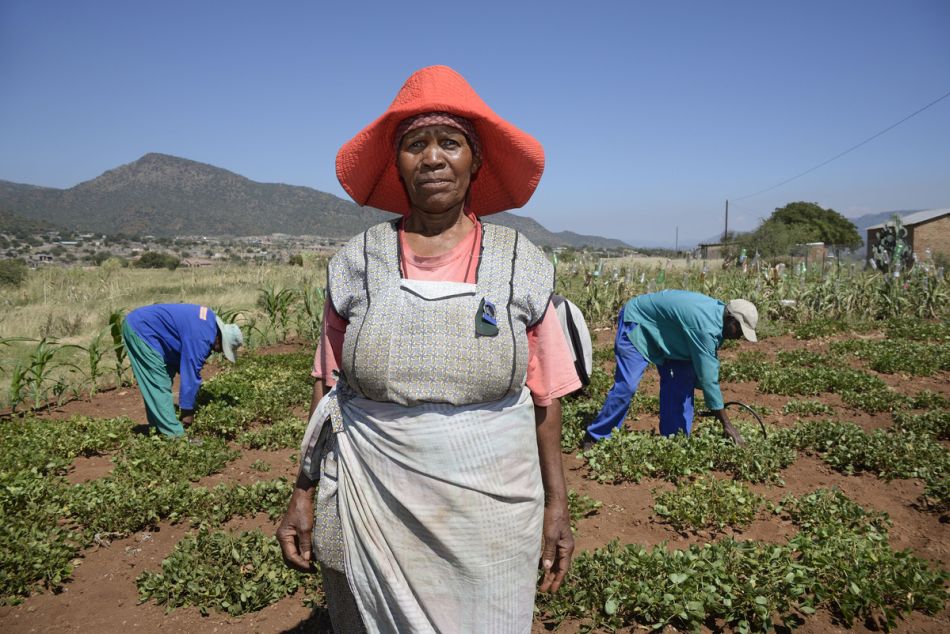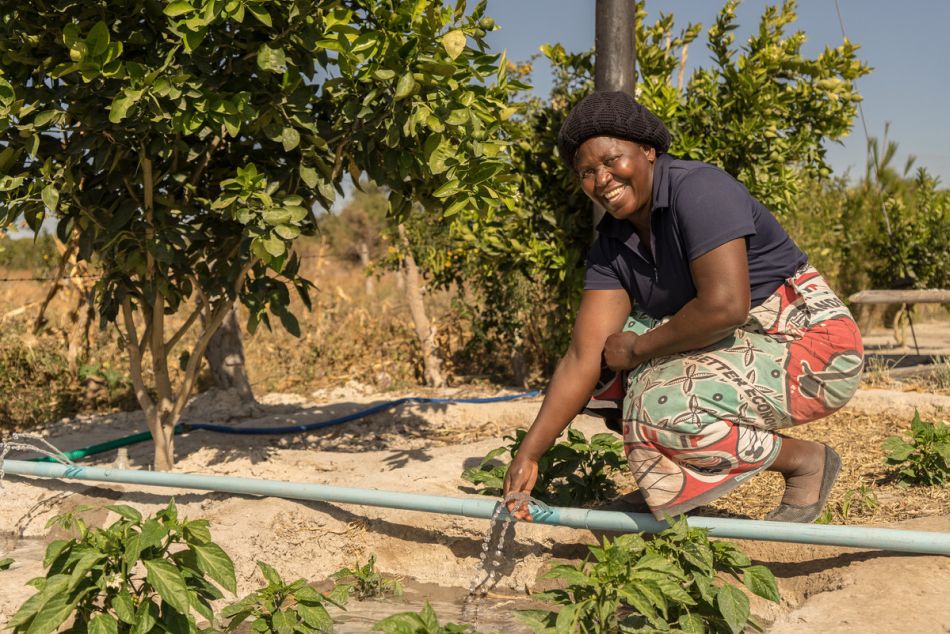By Barbara Van Koppen, Emeritus Scientist, IWMI
Who gets to decide how water is accessed, used, and managed? Is it the state, the people, the gods, or the tribal chief? Studies show that in much of the developing world, the practice is a combination of these. But on (legal) paper, it very often is not, or if it is, it is not always enforceable. How can legal systems be improved to better grapple with this diversity?
Answers to these questions lie in the legal recognition of customary water tenure – a relatively new term that describes an age-old phenomenon. Customary water tenure refers to the relationships between community members, as individuals or groups, with respect to water resources.

Remarkably, the importance of customary water tenure is better recognized in other legislation, as Jessica Troell, Senior Attorney and Director of the International Water and Africa Programs at the Environmental Law Institute (ELI), and Stephanie Keene found in their 15-country study “Whose water” in partnership with the Rights and Resources Institute (RRI). As Troell presented at the virtual Water Commons Conference of the International Association of the Study of the Commons, in May 2021, their study examined a broad cross-section of water-relevant legislation, including constitutions, land, environment, and forest laws. In particular, indigenous peoples and local communities customarily own and manage at least 50% of the world’s lands. But they only have legal titles to 10%. The study identified diverse legislative land-water nexuses, where the legal linkages between land, forest, and water tenure rights have important impacts on the recognition and protection of community-based and customary water tenure rights.
Secure community land tenure rights are widely accepted as a prerequisite for sustainable land governance and the realization of sustainable development and climate goals. But customary water tenure rights have yet to catch up. The “Whose water” report found that most communities face a broad range of procedural obstacles to realize their water use, governance, and exclusion rights. These requirements (such as water use permits, and other administrative obligations) not only commonly limit the duration of communities’ rights to use freshwater but are also cumbersome and unaffordable. In addition, the ability of communities to protect the water resources they depend on through rights of exclusion and external enforcement is inadequately supported by existing national laws.
In the water sector, the past few years have seen a growing attention to these issues by several partners – engaging with governments and communities alike – to accelerate the legal recognition of community-based water rights through support to legislative reforms that recognize and protect the full bundle of community-based water tenure rights. These efforts also point to the serious pitfalls of the continuation of colonial law (Roman Dutch Law) through permits that claimed colonial ownership of water resources (mainly surface water, at the time) and issued permits to settlers only, relegating indigenous peoples to a weaker legal status. This conclusion has emerged from the following research and policy dialogues conducted by the International Water Management Institute (IWMI) and partners, supported by the CGIAR Policies, Institutions and Markets Research Program.
Where customary water tenure has worked
Without romanticizing customary arrangements, there are good stories to tell about customary water tenure in rural sub-Saharan Africa, both for ‘sharing in’ water resources within communities and for ‘sharing out’ water resources between communities.
Rural communities in sub-Saharan Africa generally perceive water resources as a common good given by a higher force, or god, according to Barbara van Koppen, IWMI Scientist Emerita, in her presentation at the same virtual Water Commons Conference of the International Association of the Study of the Commons . Her field work and literature review showed how community members have a right by birth or marriage to the water resources falling on, flowing by, or located under communities’ territories or pastoral routes – or so-called ‘socio-territorial water resource rights.’

Investments in individual or collective water storage and conveyance infrastructure for self-supply are rewarded with strong rights to water stored and conveyed, for any use. Yet this water is often also shared with community members with less access to water on the premises or at plots. When seasonal droughts tighten their grip and water resources stop flowing into infrastructure, moral economies and social safety nets prioritize water resource allocation that meets basic domestic uses for all – even for neighboring communities.
Evidence of equitable ‘sharing out’ of water resources with neighboring communities was also found by Hans Komakech, Centre Director of WISE – Futures and Senior Lecturer at the Nelson Mandela African Institution for Science and Technology in Arusha, Tanzania, who studied this phenomenon in northern Tanzania. He presented his findings at the “Hybrid water law” webinar of FAO’s Water Tenure Mondays. In northern Tanzania, river committees between communities have evolved when an increasing number of communities constructed more furrows from a common mountain stream. Komakech also analyzed the interface with state water authorities. The latter recognized these living arrangements and, instead of seeking to override these arrangements with individual permits, they assisted by recording the agreed times for rotations along the common stream on paper.
However, such respect and support to communities’ own conflict management arrangements by state authorities is rare. Most African states promulgate and seek to implement the colonial permit systems. This obliges customary water users to apply for permits, and still overrides customary tenure. Unfortunately, this approach criminalizes the smallholder farmer, who can’t afford to pay a water use permit, and creates an administrative burden on a state, as it is unable to enforce non-compliance. Those who use very small water volumes are exempted from that obligation, signifying a second-class legal status.
‘Hybrid water law’ seeks to address this issue. At the aforementioned FAO Water Tenure Mondays webinar, Barbara Schreiner, Executive Director of the Water Integrity Network, conceptualized ‘hybrid water law’ as a suite of legal tools that are fit-for-purpose in different contexts across the African continent. Here, she argued that small-scale and customary users should be legally protected. However, she added that the legal tool of permitting should continue to be targeted at the relatively few big users to regulate their water use, respecting customary water tenure.
Indeed, rural communities are most vulnerable when powerful third parties take up water resources. Hence, during the planning of new infrastructure, their permit application processes should ensure that communities participate, and are informed of possible impacts on the water resources they use. Communities have to consent, and, as needed, be compensated for negative impacts.
Examples from across Africa
Such differentiated permitting already happens in Kenya. At the 2020 Biennial Conference of the Water Institute of South Africa (WISA), Boniface Mwaniki, then with the Water Resource Authority in Kenya, shared the successful case of Kenya’s national regulations, where different groups of water users are sorted into categories from “A” to “D.” Under this system, small “A” users only need to be locally registered, while the highest-impact “D” users are strictly regulated at national level. If conflict arises between users, Kenyan water authorities recognize existing customary norms as the starting point.
Meanwhile, the goal of the South African National Water Act goes a step further by reallocating water resources already appropriated by the ‘haves’ – powerful vested (and largely white) water users – to the ‘have-nots,’ which encompass the country’s historically marginalized black water users. As IWMI Researcher Patience Mukuyu asserted at the virtual Water Commons Conference of the International Association of the Study of the Commons in May 2021, the resistance by vested water users (and their lawyers) unfortunately remains stiff.
Echoing the above-mentioned importance of harmonization across legislation, Mukuyu explored ways to recognize and protect customary water tenure, in any case, in South Africa’s former homelands. Further, the nationwide Basic Human Needs Reserve – and indeed human rights law across the world – should redefine basic human needs beyond the current definition of drinking and domestic uses only. Small-scale water uses also realize constitutional rights to food, and this highest priority should be enforced. Ultimately, rights-based water resource allocation may appear to be the most effective to address legal pluralism for poverty alleviation and broad-based agricultural growth.

